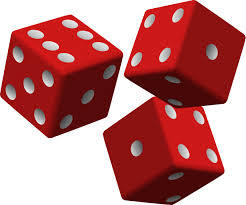Three dice thrown simultaneously.
 Three fair cubical dice are thrown. If the probability that the product of the scores on the three dice is
is
, where
are positive coprime integers, then find the value of
.
Three fair cubical dice are thrown. If the probability that the product of the scores on the three dice is
is
, where
are positive coprime integers, then find the value of
.
You can try my other Probability problems by clicking here
The answer is 35.
This section requires Javascript.
You are seeing this because something didn't load right. We suggest you, (a) try
refreshing the page, (b) enabling javascript if it is disabled on your browser and,
finally, (c)
loading the
non-javascript version of this page
. We're sorry about the hassle.
A product of 9 0 can only be obtained if the dice show values of 6 , 5 and 3 . Considering the dice as distinct, there are 3 ! = 6 ways this result can be obtained, out of a total of 6 3 outcomes. Thus the desired probability is
6 3 6 = 3 6 1 , and thus b − a = 3 6 − 1 = 3 5 .